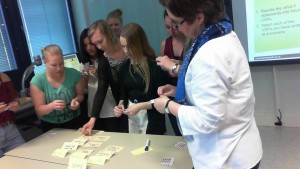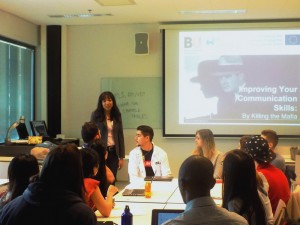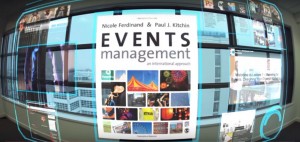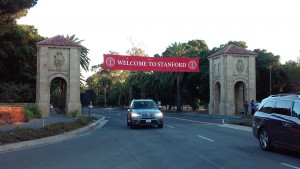Dr Nicole Ferdinand, Senior Academic in Events Management, recently returned from a week-long Erasmus mobility teaching exchange to BU Erasmus Partner, Haaga-Helia University of Applied Sciences in Porvoo, Finland. She had the opportunity to share some of her department’s cutting edge research and teaching practice. She led a series of workshops on scenario planning, inter-cultural communication and event evaluation using social media. Two of the sessions were based on research she had conducted whilst at BU. The approach used in the scenario planning workshop was based on Carnival Futures: Notting Hill Carnival 2020, a stakeholder-based approach to scenario planning which was funded by the King’s Cultural Institute. The methodology demonstrated in the event evaluation workshop was based on the Festival Impact Monitor (FestIM), which was funded by BU’s Fusion Fund. Nicole was joined for this workshop by her colleague, Dr Nigel Williams, FestIM’s Principal Investigator. As an added bonus, during her exchange she was allowed free entry to the Meeting Professionals International (MPI) Spring Mingle, which was being hosted at Haaga-Helia that week.

Haaga-Helia Events Management students joined by their lecturer, Monika Birkle for the Porvoo Events in 2050 workshop
Nicole’s week started with a scenario planning workshop entitled, Porvoo Events in 2050, in which students considered the future of events in Porvoo, given the uncertainties of the event and destination marketing skills of the industry and the yet to be formulated event development policy. Her second workshop, Improving Your Communication Skills by Killing the Russian Mafia, proved especially popular and was requested by three of Haaga-Helia’s lecturers for their student groups. Inter-cultural communication was a key skill that many Finnish students found especially challenging to acquire.

Students improving their communication skills by “Killing the Mafia”
Nicole was joined by her colleague Dr. Nigel Williams on the fourth day of her visit for the MPI Spring Mingle. Nigel was the event’s keynote speaker. Prior to the MPI event, Nicole and Nigel hosted a workshop for Haaga-Helia’s students who wanted to learn how to use social media data to undertake business and marketing research for events. Nicole also spent some of her remaining time promoting BU as an Erasmus destination and talking to staff and students planning Erasmus visits to BU next year.

Nicole and colleague Nigel meet Haaga-Helia staff and students and participate in the MPI Spring Mingle
Staff or students wishing to find out about going to Haaga-Helia for an Erasmus visit, please feel free to contact Nicole – nferdinand@bournemouth.ac.uk. She is happy to chat with you and has some helpful advice on preparing for a visit to Finland.





![Stanford[1]](http://blogs.bournemouth.ac.uk/research/files/2015/07/Stanford1-300x225.jpg)










 The first closing date for the current round of the BU Fusion Fund competition is 13 January 2012.
The first closing date for the current round of the BU Fusion Fund competition is 13 January 2012.











 Beyond Academia: Exploring Career Options for Early Career Researchers – Online Workshop
Beyond Academia: Exploring Career Options for Early Career Researchers – Online Workshop UKCGE Recognised Research Supervision Programme: Deadline Approaching
UKCGE Recognised Research Supervision Programme: Deadline Approaching SPROUT: From Sustainable Research to Sustainable Research Lives
SPROUT: From Sustainable Research to Sustainable Research Lives BRIAN upgrade and new look
BRIAN upgrade and new look Seeing the fruits of your labour in Bangladesh
Seeing the fruits of your labour in Bangladesh ECR Funding Open Call: Research Culture & Community Grant – Apply now
ECR Funding Open Call: Research Culture & Community Grant – Apply now ECR Funding Open Call: Research Culture & Community Grant – Application Deadline Friday 12 December
ECR Funding Open Call: Research Culture & Community Grant – Application Deadline Friday 12 December MSCA Postdoctoral Fellowships 2025 Call
MSCA Postdoctoral Fellowships 2025 Call ERC Advanced Grant 2025 Webinar
ERC Advanced Grant 2025 Webinar Update on UKRO services
Update on UKRO services European research project exploring use of ‘virtual twins’ to better manage metabolic associated fatty liver disease
European research project exploring use of ‘virtual twins’ to better manage metabolic associated fatty liver disease